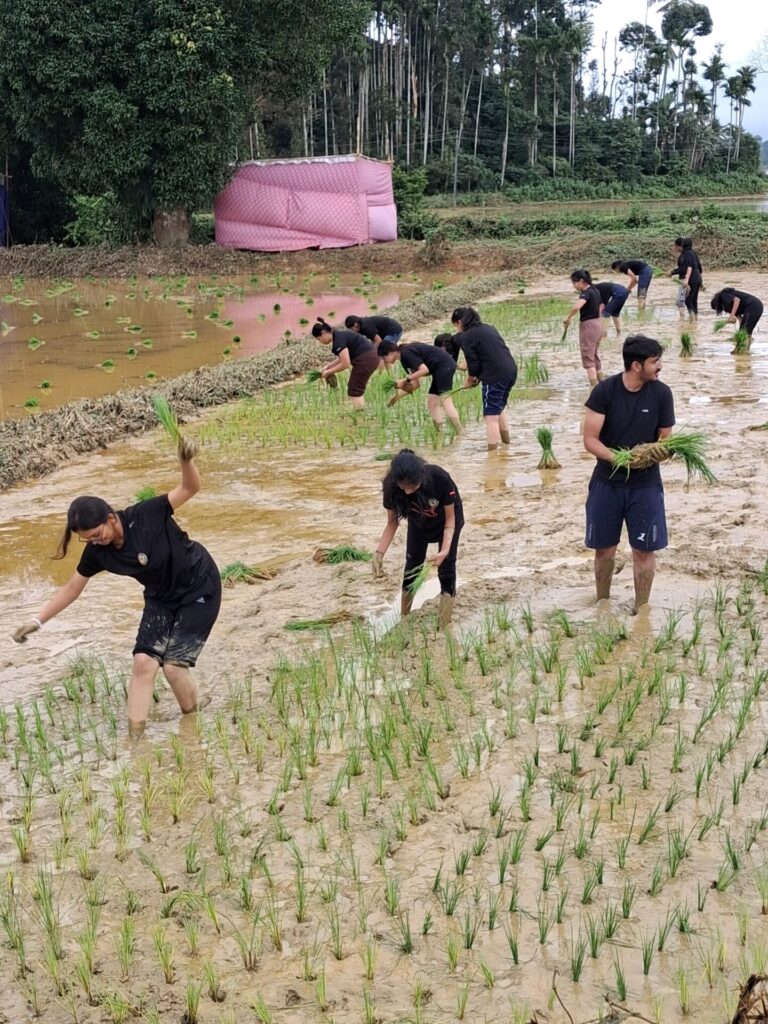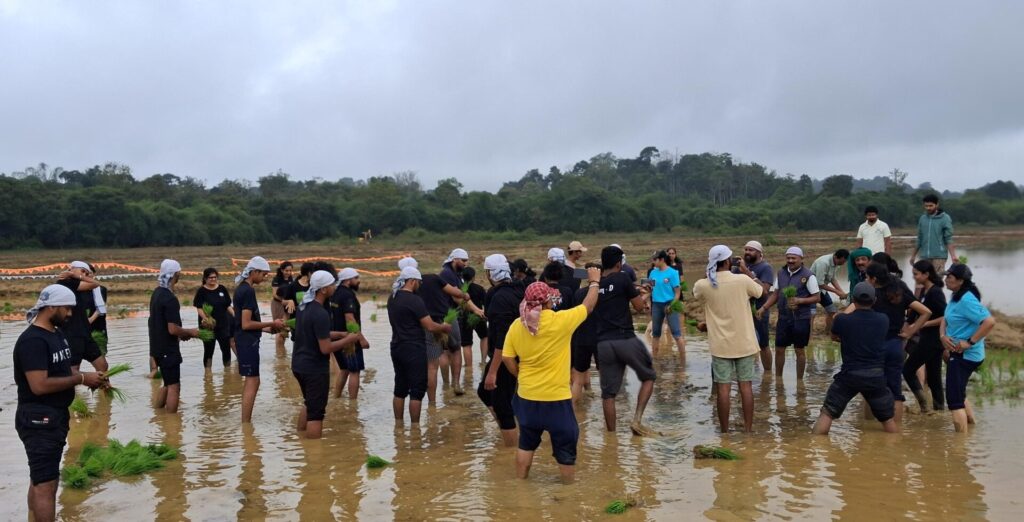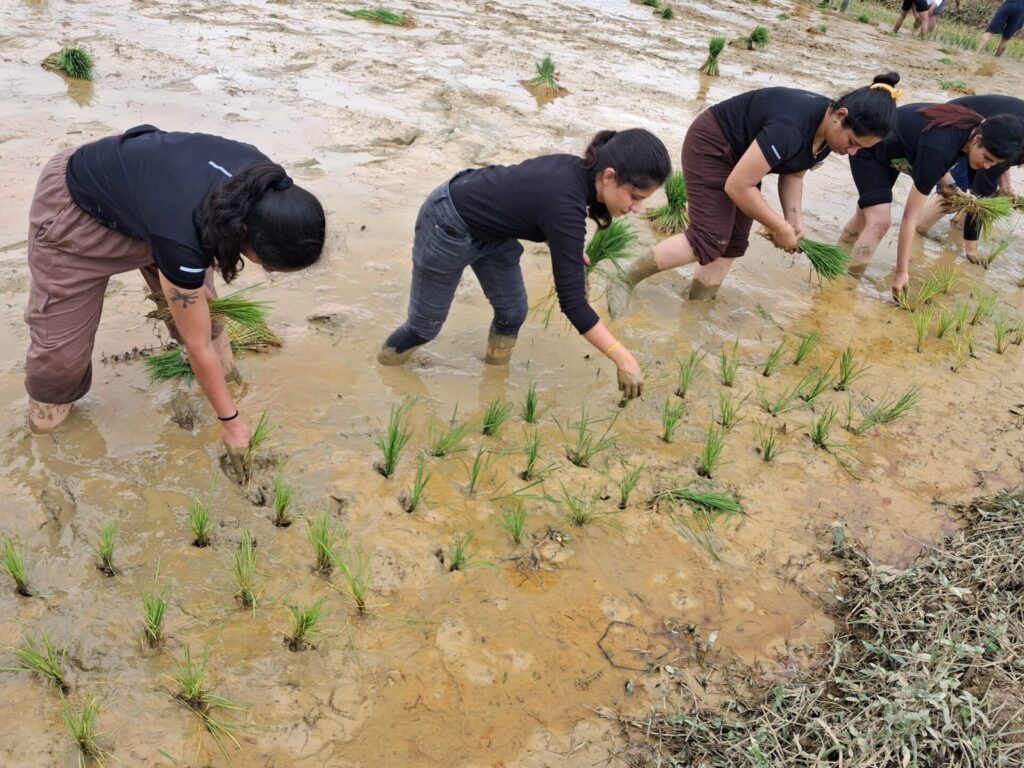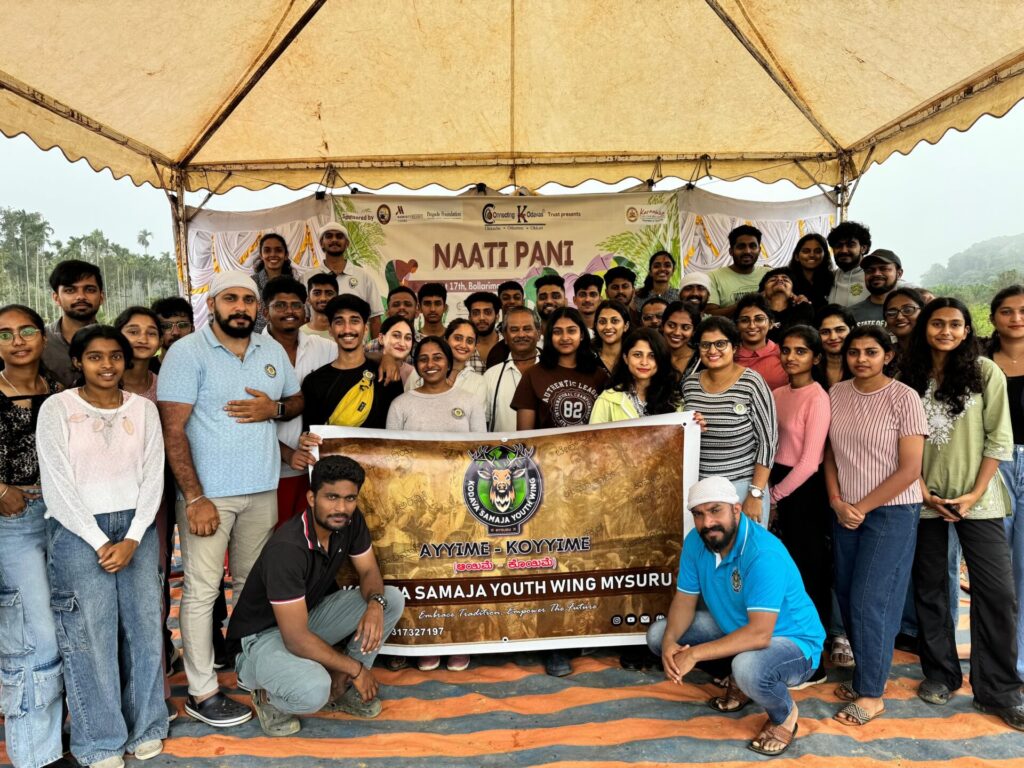By Kotera Vedith Uthaiah
A misty morning set the perfect backdrop for our Bael Pani adventure.
Over 50 STAG members began their journey from Mysore, as KODAVA SAMAJA YOUTH WING MYSURU teamed up with Connecting Kodavas at Bollarimad, Virajpete for the Bael Pani event.


Immersed in tradition, we learnt the cultural significance of Bael Pani. With hands in the soil and hearts full of pride, we successfully transplanted seedlings across acres, strengthening our bond with the heritage. A step towards preserving our culture and the land we cherish.


A heartfelt thanks to Connecting Kodavas for organizing such a thoughtful event and guiding us in preserving our roots. The day was made even more special with the serving of delicious koot curry, kool, chutne earchi and was a absolute treat after all the hard work.
Truly a feast to remember !.
CLN Research Desk :
Paddy cultivation is a serious and sacred agricultural practce.
Mr. Kaveriappa aptly commented on a previous article – “Our sacred paddy fields is what sustained our ancestors for hundreds of years”. Before the advent of Coffee, paddy cultivation sustained generations of Kodavas and other communities in Kodagu. It is a pity to see uncultivated paddy fields in Kodagu, which if cultivated will not only sustain the dietary need for rice, but will also benefit the ecology immensely by sustaining and recharging ground water in Kodagu. 40 percent of the water used in paddy fields filters through soil recharging the aquifer below.
It is heartening to see the youth being made aware of the importance of paddy cultivation. Such events should be organized every year by all the communities in Kodagu, so successive generations understand the importance and carry forward this sacred and essential legacy.
The proof of success would however be established when the younger generation participate in their relative Ainmanes’ at the time of the Puthari Festival and when the crop is harvested.
Growing paddy should be encouraged across Kodagu and amongst all communities. This is a perfect opportunity for the District Administration to encourage and also contribute in raising awareness regarding the importance of paddy cultivation and assist in popularizing the cultivation of paddy in Kodagu. Similar to coffee, where planters are incentivized in various ways by the Coffee Board, their could be similar programe for rice cultivation in the district.
Once again the efforts of Connecting Kodavas and the Jabhoomi Charitable Trust, needs all round appreciation. For it to be really successful and relevant, their ability to draw all the residents from their Okkas and their respective Ainmanes and make it a grassroots community effort will be essential. At the end of the day, if each edition of the Kodava Family Hockey Festivals are enduring successes, it should be possible to raise the same, if not more level of involvement to bring in a resurgence in paddy cultivation on a sustainable basis.



It was blissful to witness nearly 38 acres of untreated fields to see full of life with paddy saplings now in bollarimaad village,.Kodagu. Thanks to the conceptualization and efforts of connecting kodavas trust joining hands with Jabbumi charitable trust, and youngsters from Bengaluru Kodava samaja youth council and mysuru Kodava samaja youth wing and other kodava organisations coming together for ‘Naati pani’ and ‘bael pani ‘…
Paddy and then Rice which stood of irreplaceable values in the rich tradition and culture of kodavas, which were also grown with dignity and ecological vlaues had spirit of kootupani which contributed to the unity and harmony and social structure .. Let me shed some light on the paddy for its sacramental aspects for not just being the food crop.. From time immemorial in kodava ainmanes all auspicious occasions like a marriage would begin with the pattedhara or elder one in the family praying before the nellakki bolcha before being given a handfull of rice which will be thrown three times towards quickly over the head towards nellakki soon after the prayer and seeking blessings of elders thus significantly giving a “start ” to the function from the okka ainmane……..Later in the dampathi muhutrtham the bride and groom will be blessed by elders and youngsters after pouring a handfull of rice onto their head which symbolises health and prosperity…. Even while performing the last rites of a kodava the “aruva” family women keeps om putting handfull of roasted paddy from the deceased’s household till the
” kekola” or graveyard which also has the utmost vlaue in kodavas as we worship our ancestors.
The next day post funeral the “aruva” man along with the family clears the ashes and puts along the three stones(kaala, guliga and kuliya) which symbolises closing of kekola and surrounds them within three colours of threads namely black white and red puts a white cloth and pours a glass of milk ultimately again pouring a handfull of roasted paddy ..which ends the procedure of kekola……Here the roasted paddy indicates “A death’ like this shouldn’t happen in the household like the roasted paddy put on the ground which never sprouts up”..
A very good start and hope it will expand over the years to restore paddy cultivation in Kodagu.
It’s good to see the interest being shown in what is perhaps the most important and relevant agricultural activity of growing paddy (rice).
Coming from Naalnad, we pay our obeisance to Lord Igguthappa. It was most reassuring to see that the temple now has its own patch to harvest at the Puthari festival. Perhaps it is time to unite as a community and put efforts to grow the acreage for the temple so that the blessings of Igguthappa reaches committed devotees and we can hope to carry “Kadd” from the temple as we do with “thirtha” from Talekaveri.
Sincerely hope that youngsters continue to show their interest in everything relating to Kodagu. Only when we live in large cities with pollution and tension ridden lives due to the hectic pace if everything do we get to appreciate the peace and calm of our beloved _Pommale Kodagu_!
Mysore youngsters behaviour , attitude , commitment & devotion to our culture was exemplary.
Another important aspect by organizing these kinds of events bonding and more amongst Kodavas will develop within the community. 😊
We have to be a guiding force.